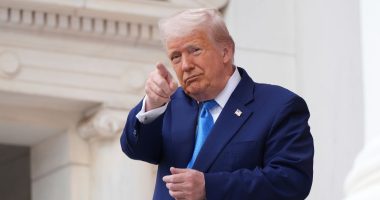Share this @internewscast.com
Inset: Lindsey Halligan, special assistant to the president, speaks with a reporter outside of the White House, Wednesday, Aug. 20, 2025, in Washington. (AP Photo/Jacquelyn Martin). Background: President Donald Trump speaks with reporters in the Oval Office at the White House, Tuesday, Feb. 11, 2025, in Washington, D.C. (Photo/Alex Brandon).
In a significant ruling on Monday, a judge declared that Lindsey Halligan, described as a “private citizen,” was never legitimately appointed as the Interim U.S. Attorney for the Eastern District of Virginia (EDVA). This decision carries obvious ramifications for the unsuccessful high-profile prosecutions involving New York Attorney General Letitia James and former FBI Director James Comey.
The broader impact on the district’s routine cases, known as the Rocket Docket, remains less clear, though several of these cases also bear Halligan’s involvement.
While the longstanding Public Access to Court Electronic Records (PACER) system lists Halligan as an EDVA attorney only in the dismissed cases against James and Comey, a basic search via the Free Law Project’s CourtListener reveals her name attached to dozens of criminal proceedings as the “United States Attorney” during her brief tenure as the district’s chief prosecutor.
In nearly three dozen instances, Halligan was documented as the U.S. Attorney in cases that were launched during her short-lived role.
To put it differently, at least 30 federal criminal and civil cases feature charging documents, whether it’s an information, indictment, or complaint, where Halligan is named as one of the prosecuting attorneys.
The subject matter of these cases is diverse, covering a wide range of allegations including fraud, conspiracy, theft, vehicle and traffic infractions, firearms offenses, assault, and drug charges, among others.
To be clear, in each instance, Halligan’s name and defunct title appear in the typed-out signature block area of the cases in question — she does not appear to have physically signed the charging documents.
But Halligan is still listed as the U.S. Attorney in each case. And, perhaps notably, Halligan’s name also appears on several other government filings in several other cases — routine docket entries in cases that were initiated before Halligan took the reins at EDVA.
So, now that the James and Comey cases have been tossed due to the defective appointment, does Halligan’s name being on these other cases portend something like a bonanza for defense attorneys? Could criminal defendants in these more basic cases start latching onto the appointment issue to their benefit?
One prominent defense attorney says it’s worth a shot to file a motion to dismiss based on Halligan’s lack of authority in the EDVA.
“I would,” National Association of Criminal Defense Lawyers (NACDL) President Andrew Birrell told Law&Crime. “Why not?”
The president of the membership-based criminal defense nonprofit likened the strategy to the rare, and admittedly old-fashioned, method of filing a writ of quo warranto – a common law remedy challenging someone’s right to hold a certain office or position of power.
“This is sort of what they did here,” Birrell said, referring to the successful defense effort to disqualify Halligan.
In the court’s order, the judge takes note of Halligan’s would-be appointment date — effectively backdating the impropriety.
“I conclude that the Attorney General’s attempt to install Ms. Halligan as Interim U.S. Attorney for the Eastern District of Virginia was invalid and that Ms. Halligan has been unlawfully serving in that role since September 22, 2025,” Senior U.S. District Judge Cameron McGowan Currie wrote in the 29-page order disqualifying President Donald Trump’s hand-picked prosecutor.
The judge goes on to explain, at length:
I have already concluded that Ms. Halligan’s original appointment was invalid and that the Attorney General’s attempt to retroactively bestow Special Attorney status on her was ineffective. As a result, the Attorney General “could not have authorized” Ms. Halligan, who was not an attorney for the Government at the time, to present Mr. Comey’s indictment to the grand jury on September 25. The implications of a contrary conclusion are extraordinary. It would mean the Government could send any private citizen off the street — attorney or not — into the grand jury room to secure an indictment so long as the Attorney General gives her approval after the fact. That cannot be the law.
Operating on that understanding, might other defendants in Halligan-denominated EDVA cases find some grist for the dismissal mill?
The NACDL’s president says they just might.
“The defense attorney’s job is to make sure the rights of the accused are honored at every single stage of the prosecution,” Birrell went on. “And what we have now is a judge who says Lindsey Halligan doesn’t have the legal authority to act. And if a defendant was indicted under the auspices of Halligan named U.S. Attorney, the defense attorney has an obligation to challenge the indictment.”
And, in at least one of those aforementioned cases, the government is quickly dealing with another iteration of a Halligan-focused defense strategy.
On Nov. 12, attorneys for Mohammad Sharifullah — who was indicted in May of this year — filed a motion to disqualify Halligan. The defense motion argues “even when an indictment has been obtained by an ‘authorized representative’ of the government, participation or supervision by an improperly appointed U.S. attorney ‘would be unlawful.’”
On Monday, the judge overseeing Sharifullah’s case ordered the government to respond to the disqualification motion.
The U.S. Department of Justice, for their part, offered a whiplashing response to Halligan’s disqualification.
By midafternoon on Monday, EDVA prosecutors were ordered to start using another name in lieu of Halligan’s name on their filings going forward — but that guidance was reversed by 4:30 p.m. on Monday, according to anonymous sources cited by CBS News reporter Scott MacFarlane.
The embarrassing nature of the Trump administration’s failure to sustain its marquee cases against James and Comey notwithstanding, Halligan’s inappropriate managerial shift at EDVA may have significant knock-on effects for “one of the crowned jewels” of the U.S. legal system.
“What a dangerous place to have a nonconforming U.S. Attorney,” Birrell mused. “That’s where a lot of the spy cases and other, related government matters are charged.”
















